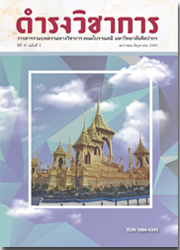Analyzing Research Gap on Community Based Tourism in Thailand
Keywords:
Community based tourism, Knowledge key gap, Research synthesisAbstract
This study aimed to synthesize the related research in the realm of community based tourism (CBT) in Thailand. It also explored the key gaps in knowledge for further studies. Secondary data both qualitative and quantitative were gathered between January and February 2017 from online academic databases and analyzed based on descriptive statistics and content analysis. The findings revealed that the total number of 240 published papers on CBT in Thailand have been identified. The research was conducted mostly in 2015 and focused mainly on the local communities in the north of Thailand. Under the study of CBT, management and development as well as community participation were the major focus. In each period, the direction and an increasing number of the relevant studies are consistent with the growth of CBT and its dramatic increase in Thailand. The review findings suggest that further research is required on 1) CBT Marketing and visitors 2) CBT Hospitality and services 3) CBT Knowledge sharing 4) CBT Knowledge transfer 5) CBT Monitoring and assessment 6) CBT Management by lessons learned 7) CBT in Protected areas 8) CBT Initiatives throughout ASEAN countries and 9) Creative CBT.
References
Boonratana R., 2010. “Community-based tourism in Thailand: The need and justification for an operational definition.” Kasetsart Journal of Social Sciences 31 (2): 280-289.
Butler R., Curran R., & O’Gorman K.D., 2012. “Pro-poor tourism in a first world urban setting: case study of Glasgow Govan.” International Journal of Tourism Research 15 (5): 443-457.
Chairuang A., Doktaisong B., Banchirdrit S-A., & Sriharun B., 2015. “The Development Strategy of Sustainable Tourism Management According to Khmet Civilization in the Lower Northeast.” Journal of Graduate Studies Valaya Alongkron Rajabhat University 9 (1): 64-80.
Dangi T.B., & Jamal T., 2016. “An Integrated Approach to “Sustainable Community-Based Tourism.” Sustainability 8 (5): 1-32.
Dolezal C., 2011. “Community-based tourism in Thailand: (Dis-)Illusions of authenticity and the necessity for dynamic concepts of culture and power.” ASEAS - Austrian Journal of South-East Asian Studies 4 (1): 129-138.
Dolezal C., 2015. “The tourism encounter in community-based tourism in Northern Thailand: empty meeting ground or space for change?” ASEAS – Austrian Journal of South-East Asian Studies 8 (2): 165-186.
Ellis S., & Sheridan L.M., 2014. “The legacy of war for community-based tourism development: learnings from Cambodia.” Community Development Journal 49 (1): 129-142.
Emphandhu D., 2008. Principles of Recreation and Nature Tourism. Bangkok: Department of Conservation, Faculty of Forestry, Kasetsart University.
Emphandhu D., & Polpiwat U., 2006. “Strategic policy options for enhancement of national park and local community linkage in tourism management of Thai national parks.” Kasetsart Journal of Social Sciences 27 (2): 347-362.
Emphandhu D., & Songpornwanich S., 2013. “Community based tourism and protected areas: overview of its challenging issues.” In Seminar on natural resources adaptation to the global climate change: Extended abstracts (pp. 96-100). Bangkok: Center for Advanced Studies in Tropical Natural Resources (CASTNaR), Kasetsart University, 16 July 2013.
Goodwin H., & Santilli R., 2009. Community-based tourism: a success? ICRT Occasional paper 11. Retrieved April 30, 2017, from http://www.haroldgoodwin.info/uploads/CBTaSuccessPubpdf.pdf.
Kaewsanga P., & Chamnongsri N., 2012. “Creative tourism: A new choice of Thai tourism.” Suranaree Journal of Social Science 6 (1): 91-109.
Lindström K.N., & Larson M., 2016. “Community-based tourism in practice: evidence from three coastal communities in Bohuslän, Sweden.” Bulletin of Geography. Socio-economic Series (33): 71-78.
López-Guzmán T., Sánchez-Cañizares S., & Pavón V., 2011. “Community-based tourism in developing countries - a case study.” Tourismos: An International Multidisciplinary Journal of Tourism 6 (1): 69-84.
Moisey R.N., 2002. “The economics of tourism in national parks and protected areas.” In P.F.J. Eagles & S.F. McCool (eds.), Tourism in National Parks and Protected Areas: planning and management (pp. 235-253). Wallingford: CABI Publishing.
Novelli M., Klatte N., & Dolezal C., 2017. “The ASEAN community-based tourism standards: looking beyond certification.” Tourism Planning and Development 14 (2): 260-281.
Okazaki E., 2008. “A community-based tourism model: Its conception and use.” Journal of Sustainable Tourism 16 (5): 511-529.
Patamajoroen R., 2011. “Impacts of Tourism to Ethnic Groups: Comparison between Morgan and Sakai.” Songklanakarin J. of Social Sciences & Humanities 17 (3): 346-352.
Rocharungsat P., 2005. Community-based tourism: perspectives and future possibilities. Doctoral dissertation. School of Business, Tourism Program, James Cook University, Queensland.
Rocharungsat P., 2012. “Synthesis article on community tourism: Different issues, Together thinking.” Area Based Development Research Journal 4 (3): 88-101.
Sangsnit N., 2013. “Sustainable tourism development in Thailand.” In UNWTO Conference on Sustainable Tourism Development (pp. 214-221). Hyderabad: World Tourism Organization UNWTO, 12 April 2013.
Satarat N., 2010. Sustainable Management of Community-Based Tourism in Thailand. Doctoral dissertation. School of Public Administration, National Institute of Development Administration, Bangkok.
Sinth S., Wongthapthim U., & Songpornwanich S., 2002. Community-based tourism: concepts and experiences. Chiang Mai: Mingmuangnawarat.
Suansri P., 2017. “Community based tourism.” Tourism Economic Review 7: 54-67.
Suansri P., 2017. What do you think about the perspective on CBT 4.0? Retrieved March 30, 2017, from https://www.facebook.com/potjana.suansri.
Suansri P., & Yeejaw-haw S., 2013. Community based tourism (CBT) standard handbook. Bangkok: Wanida Karnpim Limited Partnership.
Thakur R.K., 2013. Community based village tourism in Nepal: A case study of Sirubari village, Nepal. Master’s dissertation. Department of Tourism and Hospitality Management, The Global Open University, Nagaland.
Weaver D., 2010. “Community-based tourism as strategic dead-end.” Tourism Recreation Research 35 (2): 206-208.
Zong C., Cheng K., Lee C-H., & Hsu N-L., 2017. “Capturing Tourists’ Preferences for the Management of Community-Based Ecotourism in a Forest Park.” Sustainability 9 (9): 1-16.
Downloads
Published
Issue
Section
License
บทความนี้เป็นผลงานของข้าพเจ้าแต่เพียงผู้เดียว และ/หรือเป็นผลงานของข้าพเจ้าและผู้ร่วมงาน ตามชื่อที่ระบุในบทความจริง และเป็นผลงานที่มิได้ถูกนำเสนอหรือตีพิมพ์ที่ใดมาก่อน




